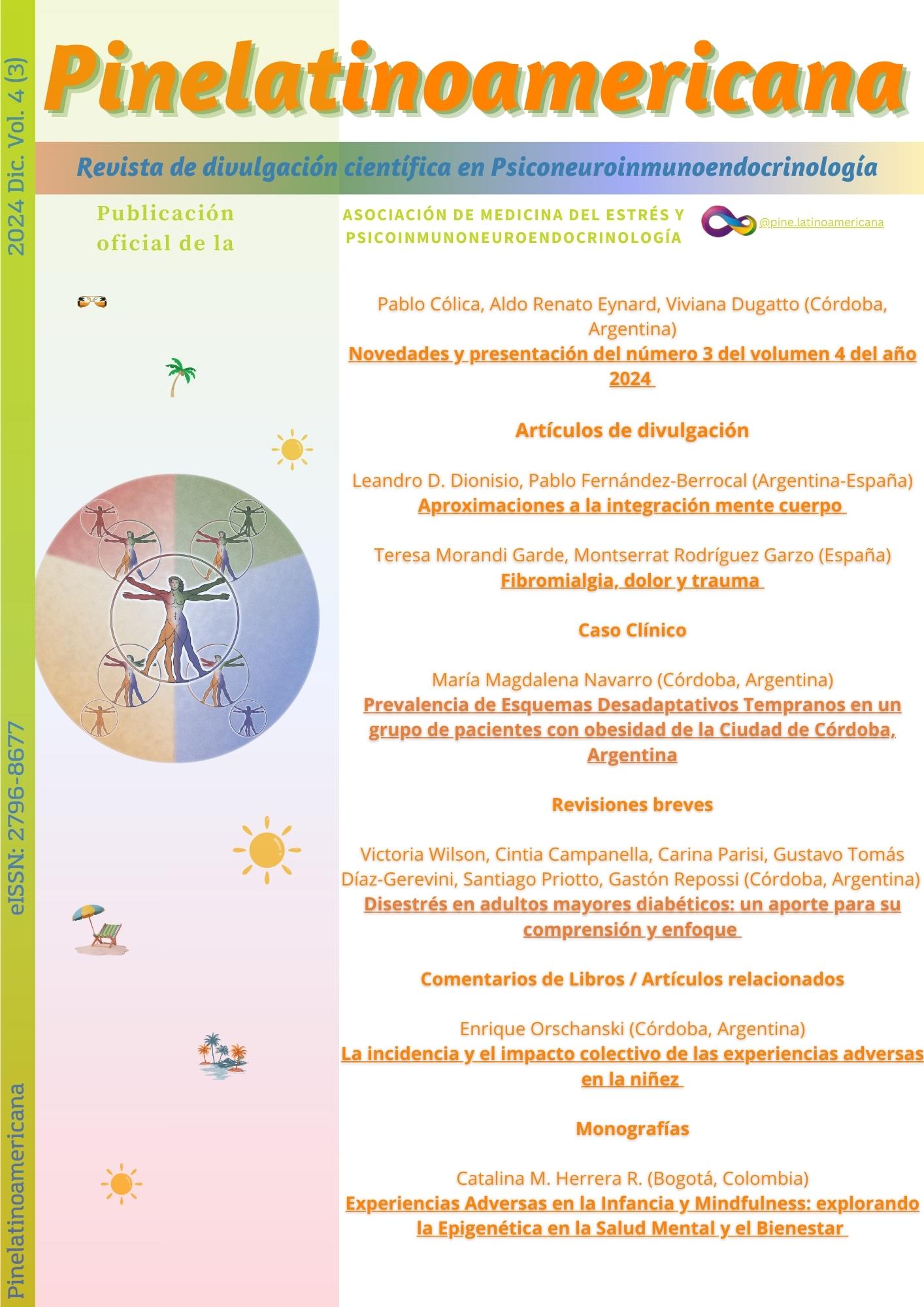Abstract
Introduction. Several studies have associated Early Maladaptive Schemas (EMS) in people with obesity. The interest in identifying them is based on the importance of transdisciplinary work in patients with chronic pathologies, whose treatments require lifestyles changes and psychotherapeutic work aimed at modifying dysfunctional beliefs and harmful behaviors. Knowledge of these behavioral patterns in people with obesity may be a useful approach to detect resistance to beneficial behavioral changes when adverse environmental circumstances arise, as well as to avoid interference in the evolution and maintenance of healthy behaviors in the long term.
Objective. Determine the prevalence of EMS in a group of people with obesity residing in the city of Córdoba, Argentina.
Hypothesis. People with obesity who present EMS may experience difficulties in treatment adherence, as well as in the acquisition and maintenance of long-term healthy habits.
Methods. this study is a descriptive one and intentional non-probabilistic method was used to obtain the sample. Participants included men and women over 25 years of age with a diagnosis of obesity based on the BMI (Body Mass Index) from Córdoba city, Argentina. EMS were assesed using the CEY – S3 (Y S Q – S3- JY05) questionnaire adapted to Spanish.
All participants provided written informed consent after being briefed about the objectives, procedures, benefits, possible risks of the study and confidentiality of their personal data.
Results. The highest average EMS scores were observed in: emotional deprivation, vulnerability to danger and illness, insufficient self-control, self-sacrifice and unattainable goals. In the disconnection and rejection domain, the emotional deprivation showed the highest average score. In the impaired autonomy and performance domain, vulnerability to danger and illness scored highest. In the insufficient limits domain, 39% of patients showed the highest scores in insufficient self-control. The EMS of self-sacrifice was the one with the highest average score considering both the other-orientation domain and the remaining four domains. In the overvigilance and inhibition domain, the EMS of unattainable goals was the one with the highest average score.
Conclusion. The results provide additional evidence confirming similar EMS patterns in people with obesity as recorded in previous studies.
References
Aballay, L. R. (2020). Base de datos utilizada al estudio de la obesidad y otras enfermedades crónicas en Córdoba. Universidad Nacional de Córdoba, Facultad de Ciencias Médicas, Escuela de Nutrición; Consejo Nacional de Investigaciones Científicas y Técnicas, Instituto de Investigaciones en Ciencias de la Salud. [Data set]. http://hdl.handle.net/11086/17047.
Aballay, L. R., Eynard, A. R., Díaz, M.delP., Navarro, A., & Muñoz, S. E. (2013). Overweight and obesity: a review of their relationship to metabolic syndrome, cardiovascular disease, and cancer in South America. Nutrition reviews, 71(3), 168–179. https://doi.org/10.1111/j.1753-4887.2012.00533.x
Aguilera Sosa, V. R., Leija Alva, G., Rodríguez Choreño, J. D., Heman Contreras, A., Trejo Martínez, J. I. y López de la Rosa, M. R. (2009). Evaluación de cambios en esquemas tempranos desadaptativos y en la antropometría de mujeres obesas con un tratamiento cognitivo conductual grupal. Revista Colombiana de Psicología, 18(2), 157–166. https://revistas.unal.edu.co/index.php/psicologia/article/view/10285
Arango Restrepo, C. y Villegas Cuartas, M. (2013). Esquemas maladaptativos tempranos y eventos vitales presentes en un grupo de personas adultas diagnosticadas con obesidad de Medellín, Colombia. [Trabajo de Grado. Universidad Pontificia Bolivariana]. http://hdl.handle.net/20.500.11912/1113
Bilibio Westphalen, R. y Della Mea, C. (2018). Esquemas iniciais desadaptativos em indivíduos com diagnóstico de obesidade. Portal de Conferências. XII Mostra de Iniciação Científica e Extensão Comunitária e XI Mostra de Pesquisa de Pós-Graduação IMED 2018. https://soac.atitus.edu.br/index.php/mic/xiimic/paper/view/1072
Cappelletti, A. y Katz, M. (2018). Obesidad: Encrucijadas y Abordajes. Librería Akadia Editorial.
Cid, J. y Torrubia, R. (2010). Adaptación española del Cuestionario de Esquemas de Young en la versión 3 reducida [Spanish version of the Young Schema Questionnaire-S3]. [Manuscrito no publicado].
Díaz, G. T., Campanella, C., Pigino, G., López, C., Priotto, S. y Repossi, G. (2022). Psicoinmunoneuroendocrinología (PINE): un enfoque para la comprensión, prevención y tratamiento del deterioro cognitivo asociado a la obesidad. Pinelatinoamericana, 2(3), 240-254. https://revistas.unc.edu.ar/index.php/pinelatam/article/view/38785
IBM Corp. (2017). IBM SPSS Statistics for Windows, Version 25.0. IBM Corp.
Luz, F. Q. d. (2013). Distorções cognitivas, esquemas iniciais desadaptativos, depressão, ansiedade e estresse em obesos mórbidos e pessoas com peso normal. [Tesis de maestría. Pontifícia Universidade Católica do Rio Grande do Sul]. https://tede2.pucrs.br/tede2/handle/tede/852
Ministerio de Salud y Desarrollo Social. Presidencia de la Nación (Argentina). 4ª Encuesta Nacional de Factores de Riesgo: Principales Resultados. (2021) Dirección Nacional de Promoción de la Salud. https://www.fmed.uba.ar/sites/default/files/2022-03/4ta-encuesta-nacional-factores-riesgo_2019_principales-resultados.pdf
Rodríguez Vílchez, E. (2009). La terapia centrada en esquemas de Jeffrey Young. Avances En Psicología, 17(1), 59–74. https://revistas.unife.edu.pe/index.php/avancesenpsicologia/article/view/1908
Rodríguez-Flores, A. y Sandoval Herrera, V. (2023). Efectos biológicos de los azúcares libres en la salud. Pinelatinoamericana, 3(3), 217-233. https://revistas.unc.edu.ar/index.php/pinelatam/article/view/43222
Tamayo Lopera, D. y Restrepo, M. (2014). Aspectos psicológicos de la obesidad en adultos. Revista de Psicología Universidad de Antioquia, 6(1), 91-112. http://pepsic.bvsalud.org/scielo.php?script=sci_arttext&pid=S2145-48922014000100007&lng=pt&tlng=es.
Tomás, B. M. (2024). Relación entre la adquisición de conductas adaptativas según prácticas de crianza materna y cambios en los sistemas sensorio-neuro-endocrinos en el desarrollo infantil . Pinelatinoamericana, 4(2), 62-74. https://revistas.unc.edu.ar/index.php/pinelatam/article/view/45605
Young, J. E. (2016). Terapia de esquemas. Desclée De Brouwer.

This work is licensed under a Creative Commons Attribution-NonCommercial 4.0 International License.
Copyright (c) 2024 Pinelatinoamericana

